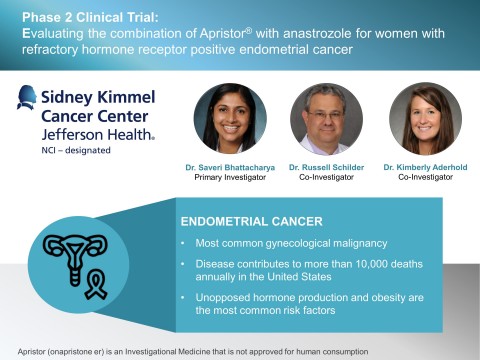PHILADELPHIA--(BUSINESS WIRE)--Context Therapeutics, a clinical-stage biopharmaceutical company dedicated to advancing medicines for hormone driven cancers, today announced a Phase 2 clinical collaboration with the Sidney Kimmel Cancer Center at Jefferson Health. This clinical collaboration will evaluate whether the addition of Apristor® to the antiestrogen, anastrazole, can enhanced outcomes for patients with metastatic endometrial cancer who have failed multiple prior therapies.
The Phase 2 trial will assess an oral treatment consisting of the progesterone receptor antagonist, Apristor (onapristone ER) plus the antiestrogen, anastrazole, in up to 25 patients who are ER+,PR+,HER2- and who have received prior chemotherapy treatment. The primary endpoint will be overall response rate (ORR), which is the proportion of patients who have either a complete or partial response. To further characterize the activity of Apristor, secondary endpoints will include duration of response, clinical benefit rate, and progression-free survival (PFS). In addition, this study will evaluate the safety and pharmacological profile of oral combination in these patients, as well as biomarker analyses to explore predictive factors of response to complete hormone blockade. This data will support Context’s ongoing Phase 2 studies and help design a future Phase 3 trial.
“Currently, there are limited therapeutic options to treat endometrial cancer in the advanced setting. Recent preclinical findings, together with Phase 1 study results in patients with advanced PR+ ovarian and endometrial cancers, give us reason to believe that Apristor can help women with PR+ gynecological cancers,” said Martin Lehr, CEO of Context Therapeutics. [1],[2]. “We believe Apristor can make a meaningful difference for patients in the trial.”
The study, sponsored by Jefferson Health, will be led by the Primary Investigator, Dr. Saveri Bhattacharya, an Assistant Professor of Medical Oncology. Dr. Russell Schilder, Director of the Gynecologic Oncology Program, and Dr. Kimberly Aderhold are the study’s Co-Investigators. Final study design and other details will be announced upon enrollment of the first patient, expected around the end of 2019 or early 2020.
“Context is humbled by the support and enthusiasm of Dr. Bhattacharya and her colleagues at Jefferson,” said Mr. Lehr. “The gynecologic oncology program at Jefferson is one of the top in the country and we are fortunate that Jefferson is right in our backyard.”
“The majority of endometrial cancer patients have hormone driven cancer. The hormones estrogen and progesterone drive endometrial cancer progression in those patients, but antiestrogens are the only antihormonal therapy available to clinicians. Given the broad use of antiestrogens, antiestrogen resistance is now a major clinical challenge,” said Dr. Bhattacharya. “We believe that a progesterone receptor antagonist has the potential to address antiestrogen resistance by working with an antiestrogen to deprive the cancer of hormone driven growth signals, which will lead to better outcomes for patients.”
About Endometrial Cancer
Endometrial cancer is the most common gynecologic malignancy in the United States with an incidence that continues to increase each year. More than 60,000 women were diagnosed with endometrial cancer in 2018 and this disease contributes to more than 10,000 deaths annually [3]. Unopposed estrogen production and obesity are the most common risk factors for the development of endometrial cancer. The majority of patients with recurrent endometrial cancer have limited therapeutic options and the development of second line therapies that result in improved response is an unmet clinical need. Using targeted hormonal treatment may present potential opportunities for improved treatment outcomes for these women.
About Apristor
Apristor (onapristone extended release) is a potent and specific antagonist of the progesterone receptor that is orally administered. Currently, there are no approved therapies that selectively target PR+ cancers. Preliminary preclinical and clinical data suggest that Apristor has anticancer activity by inhibiting the binding of progesterone receptor to chromatin, downregulating cancer stem cell mobilization, and blocking immune evasion. Apristor is an investigational drug that has not been approved for marketing by any regulatory authority.
About Context Therapeutics
Context is a clinical-stage biopharmaceutical company advancing medicines to treat hormone driven cancers. Context’s lead program is Apristor, an investigational Phase 2 drug that is being developed for progesterone receptor positive (PR+) metastatic breast, ovarian, and endometrial cancers. For more information on Context, visit www.contexttherapeutics.com.
[1] Huang, Y, et al. (2018) Inhibiting nuclear phospho-progesterone receptor enhances antitumor activity of onapristone in uterine cancer. Molecular cancer therapeutics, 17(2), 464-73.
[2] Cottu PH, et al. (2018) Phase I study of onapristone, a type I antiprogestin, in female patients with previously treated recurrent or metastatic progesterone receptor-expressing cancers. PLoS ONE 13(10): e0204973.
[3] Siegel, R.L., Miller, K.D., Jemal, A., 2019. Cancer statistics, 2019: Cancer Statistics, 2019. CA: A Cancer Journal for Clinicians 69, 7–34. https://doi.org/10.3322/caac.21551

